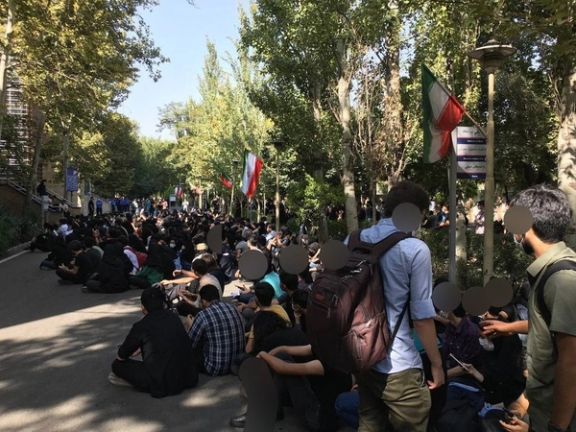Amid Hardliners' Purge Of Academia, Iranians Lose Hope

An Iranian academic has argued that purging university professors and other similar measures will not calm the country’s volatile situation and can even backfire.

An Iranian academic has argued that purging university professors and other similar measures will not calm the country’s volatile situation and can even backfire.
Bijan Abdolkarimi, a philosopher and academic who upholds an ontological world view rather than the Iranian regime’s Islamic ideology, made the comments in an interview published by the reformist Etemad daily Tuesday. At the same time, perhaps trying to protect himself, he denied being an opponent of the regime.
“The revolt of the [religious] masses and hardliners against the elite is one of the serious dangers to the Iranian Revolution,” he said in the interview that mainly focused on the recent purge of the academia and the announcements of several die-hard regime eulogist (maddah) having been invited to teach in universities.
The recent purge which some have dubbed as “homogenization” of the academia, limitations imposed on students, persecution of journalists and the parliament’s attempt to destroy independence of the country’s bar association, are examples of the campaign against the elite, he added. Persons and groups who “do not belong to the elite in any way” are seeking to find their way into the academia with the government’s help, he said.

Saeed Haddadian, one of the three maddahs who has gained a tutorial seat at Tehran University’s Literature and Humanities Faculty will be teaching “Analysing Resistance Verse”.
Resistance verse refers to poetry written about the Islamic Revolution and the eight-year-war with Iraq in 1980s.
The role of maddahs in Shiite mourning ceremonies is reciting the praises of the prophet and his companions and mourning the slaying of his grandson, Imam Hussein in the battle of Karbala, which in reality was a struggle over power in the nascent Islamic empire in the seventh century.
In the past, most maddahs had very low education or were even illiterate but in recent years some have gained university degrees, mainly in religion-related or humanities fields with the establishment’s support.
The 58-year-old Haddadian holds a PhD in Quran and Hadith and has previously been a tutor of subjects such as Islamic Revolution and Quran Interpretation at the same university. He is one of the maddahs who is often invited by Supreme Leader Ali Khamenei to perform at his own religious ceremonies on special occasions.
During his three-decade rule Khamenei has hugely encouraged the growth of the maddah establishment against the seminary-educated clerics. Less educated or even illiterate maddahs whose role was singing mourning songs in graveyards at funerals or during religious mourning occasions for a small fee have now attained high status and political influence. The majority are aligned with hardliners.
“These methods [Islamification of the academia] will not calm the country’s fueled circumstances but will rather make it worse,” Abdolkarimi said while pointing out that there is a massive class gap in the Iranian society where the middle class as “the engine of development” is excluded from involvement in decision-making by the state controlled by the hardliners.
The purge of academia, which is now being referred to by some pundits as ‘the second cultural revolution’, has shaken many Iranians who are already grappling with various pressures. The purge comes amid loss of hope in improvement of the country’s circumstances, including its economy, better relations with the international community and removal of sanctions, as well as even relative social and political freedom.
It appears from social media posts that loss of hope has even affected some religiously people who formerly supported the establishment for ideological reasons. Financial corruption and same-sex video scandals involving regime officials could have been the last blow to those whose world-view is centered around Sharia laws and had so far put up with economic pressures for “the greater good” of the society.
Among those who have lost hope, particularly the younger generation from all walks of life, emigration seems the only option for a better life. A recent poll by the US-based Statis Consulting found that almost half of Iranian youth want to leave the country amid pessimism about their future.
“All around me there are people who are emigrating, who never wished or liked to leave. I wish you [the Islamic Republic] were gone and all of these people stayed,” an anonymous person wrote in a post.